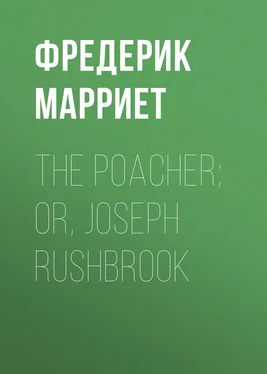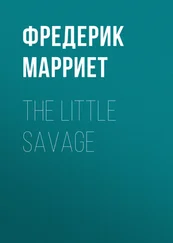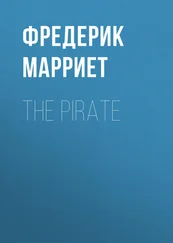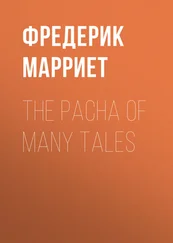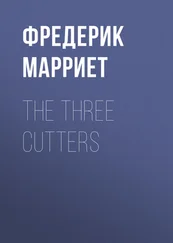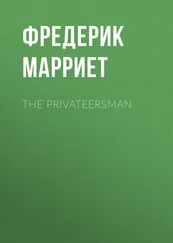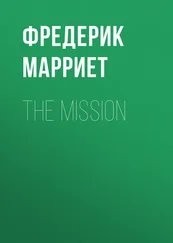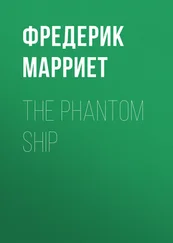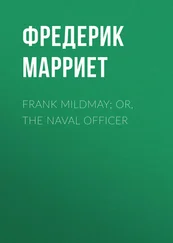Фредерик Марриет - The Poacher; Or, Joseph Rushbrook
Здесь есть возможность читать онлайн «Фредерик Марриет - The Poacher; Or, Joseph Rushbrook» — ознакомительный отрывок электронной книги совершенно бесплатно, а после прочтения отрывка купить полную версию. В некоторых случаях можно слушать аудио, скачать через торрент в формате fb2 и присутствует краткое содержание. Жанр: foreign_prose, literature_19, foreign_antique, на английском языке. Описание произведения, (предисловие) а так же отзывы посетителей доступны на портале библиотеки ЛибКат.
- Название:The Poacher; Or, Joseph Rushbrook
- Автор:
- Жанр:
- Год:неизвестен
- ISBN:нет данных
- Рейтинг книги:4 / 5. Голосов: 1
-
Избранное:Добавить в избранное
- Отзывы:
-
Ваша оценка:
- 80
- 1
- 2
- 3
- 4
- 5
The Poacher; Or, Joseph Rushbrook: краткое содержание, описание и аннотация
Предлагаем к чтению аннотацию, описание, краткое содержание или предисловие (зависит от того, что написал сам автор книги «The Poacher; Or, Joseph Rushbrook»). Если вы не нашли необходимую информацию о книге — напишите в комментариях, мы постараемся отыскать её.
The Poacher; Or, Joseph Rushbrook — читать онлайн ознакомительный отрывок
Ниже представлен текст книги, разбитый по страницам. Система сохранения места последней прочитанной страницы, позволяет с удобством читать онлайн бесплатно книгу «The Poacher; Or, Joseph Rushbrook», без необходимости каждый раз заново искать на чём Вы остановились. Поставьте закладку, и сможете в любой момент перейти на страницу, на которой закончили чтение.
Интервал:
Закладка:
Whatever may once have been the importance of the house of O’Donahue, one thing is certain, that there are many ups and downs in this world; every family in it has its wheel of fortune, which revolves faster or slower as the fates decree, and the descendant of kings before the O’Connor’s time was now descended into a species of Viceroy, Squireen O’Donahue being the steward of certain wild estates in the county of Galway, belonging to a family who for many years had shown a decided aversion to the natural beauties of the country, and had thought proper to migrate to where, if people were not so much attached to them, they were at all events more civilised. These estates were extensive, but not lucrative. They abounded in rocks, brushwood, and woodcocks during the season; and although the Squireen O’Donahue did his best, if not for his employer, at least for himself; it was with some difficulty that he contrived to support, with anything like respectability (which in that part of the country means “dacent clothes to wear”), a very numerous family, lineally descended from the most ancient of all the kings of Ireland.
Before the squireen had obtained his employment, he had sunk his rank and travelled much—as a courier—thereby gaining much knowledge of the world. If, therefore, he had no wealth to leave his children, at all events he could impart to them that knowledge which is said to be better than worldly possessions. Having three sons and eight daughters, all of them growing up healthy and strong, with commensurate appetites, he soon found that it was necessary to get rid of them as fast as he could. His eldest, who, strange to say, for an O’Donahue, was a quiet lad, he had as a favour lent to his brother, who kept a small tobacconist and grocer’s shop in Dublin, and his brother was so fond of him, that eventually O’Carroll O’Donahue was bound to him as an apprentice. It certainly was a degradation for the descendant of such ancient kings to be weighing out pennyworths of sugar, and supplying halfpenny papers of tobacco to the old apple and fish women; but still there we must leave the heir-apparent while we turn to the second son, Mr Patrick O’Donahue, whose history we are now relating, having already made the reader acquainted with him by an introduction in Saint James’s Park.
Chapter Nine
It may be supposed that, as steward of the estates, Squireen O’Donahue had some influence over the numerous tenants on the property, and this influence he took care to make the most of. His assistance in a political contest was rewarded by the offer of an ensigncy for one of his sons, in a regiment then raising in Ireland, and this offer was too good to be refused. So, one fine day, Squireen O’Donahue came home from Dublin, well bespattered with mud, and found his son Patrick also well bespattered with mud, having just returned home from a very successful expedition against the woodcocks.
“Patrick, my jewel,” said the Squireen, taking a seat and wiping his face, for he was rather warm with his ride, “you’re a made man.”
“And well made too, father, if the girls are anything of judges,” replied Patrick.
“You put me out,” replied the Squireen; “you’ve more to be vain of than your figure.”
“And what may that be that you’re discoursing about father?”
“Nothing more nor less, nor better nor worse, but you’re an ensign in his Majesty’s new regiment—the number has escaped my memory.”
“I’d rather be a colonel, father,” replied Patrick, musing.
“The colonel’s to come, you spalpeen,” said the Squireen.
“And the fortune to make, I expect,” replied Patrick.
“You’ve just hit it but haven’t you the whole world before you to pick and choose?”
“Well,” replied Patrick, after a pause; “I’ve no objection.”
“No objection! Why don’t you jump out of your skin with delight? At all events, you might jump high enough to break in the caling.”
“There’s no ceiling to break,” replied Patrick, looking up at the rafters.
“That’s true enough; but still you might go out of your seven senses in a rational sort of a way.”
“I really can’t see for why, father dear. You tell me I’m to leave my poor old mother, who doats upon me; my sisters, who are fond of me; my friends here,” patting the dogs, “who follow me; the hills, that I love; and the woodcocks, which I shoot; to go to be shot at myself, and buried like a dead dog, without being skinned, on the field of battle.”
“I tell you to go forth into the world as an officer, and make your fortune; to come back a general, and be the greatest man of your family. And don’t be too unhappy about not being skinned. Before you are older or wiser, dead or alive, you’ll be skinned, I’ll answer for it.”
“Well, father, I’ll go; but I expect there’ll be a good deal of ground to march over before I’m a general.”
“And you’ve a good pair of legs.”
“So I’m told every day of my life. I’ll make the best use of them when I start; but it’s the starting I don’t like, and that’s the real truth.”
The reader may be surprised at the indifference shown by Patrick at the intelligence communicated by his father; but the fact was, Mr Patrick O’Donahue was very deep in love. This cooled his national ardour; and it must be confessed that there was every excuse, for a more lovely creature than Judith McCrae never existed. To part with her was the only difficulty, and all his family feelings were but a cloak to the real cause of his unwillingness.
“Nevertheless, you must start to-morrow, my boy,” said his father.
“What must be, must,” replied Patrick, “so there’s an end of the matter. I’ll just go out for a bit of a walk, just to stretch my legs.”
“They require a deal of stretching, Pat, considering you’ve been twenty miles, at least, this morning, over the mountains,” replied the Squireen. But Patrick was out of hearing; he had leapt over a stone wall which separated his father’s potato ground from Cornelius McCrae’s, and had hastened to Judith, whom he found very busy getting the dinner ready.
“Judith, my dear,” said Patrick, “my heart’s quite broke with the bad news I have to tell you. Sure I’m going to leave you to-morrow morning.”
“Now, Patrick, you’re joking, surely.”
“Devil a joke in it. I’m an ensign in a regiment.”
“Then I’ll die, Patrick.”
“More like that I will, Judith; what with grief and a bullet to help it, perhaps.”
“Now, what d’ye mean to do, Patrick?”
“Mean to go, sure; because I can’t help myself; and to come back again, if ever I’ve the luck of it. My heart’s leaping out of my mouth entirely.”
“And mine’s dead,” replied Judith, in tears.
“It’s no use crying, mavourneen. I’ll be back to dance at my own wedding, if so be I can.”
“There’ll be neither wedding for you, Patrick, nor wake either, for you’ll lie on the cold ground, and be ploughed in like muck.”
“That’s but cold comfort from you, Judith, but we’ll hope for a better ending; but I must go back now, and you’ll meet me this evening beyond the shealing.”
“Won’t it be for the last time, Patrick,” replied Judith, with her apron up to her eyes.
“If I’ve any voice in the matter, I say no. Please the pigs, I’ll come back a colonel.”
“Then you’ll be no match for Judith McCrae,” replied the sobbing girl.
“Shoot easy, my Judith, that’s touching my honour; if I’m a general it will be all the same.”
“Oh, Patrick! Patrick!”
Patrick folded Judith in his arms, took one kiss, and then hastened out of the house, saying—“Remember the shealing, Judith, dear, there we’ll talk the matter over easy and comfortable.”
Читать дальшеИнтервал:
Закладка:
Похожие книги на «The Poacher; Or, Joseph Rushbrook»
Представляем Вашему вниманию похожие книги на «The Poacher; Or, Joseph Rushbrook» списком для выбора. Мы отобрали схожую по названию и смыслу литературу в надежде предоставить читателям больше вариантов отыскать новые, интересные, ещё непрочитанные произведения.
Обсуждение, отзывы о книге «The Poacher; Or, Joseph Rushbrook» и просто собственные мнения читателей. Оставьте ваши комментарии, напишите, что Вы думаете о произведении, его смысле или главных героях. Укажите что конкретно понравилось, а что нет, и почему Вы так считаете.
